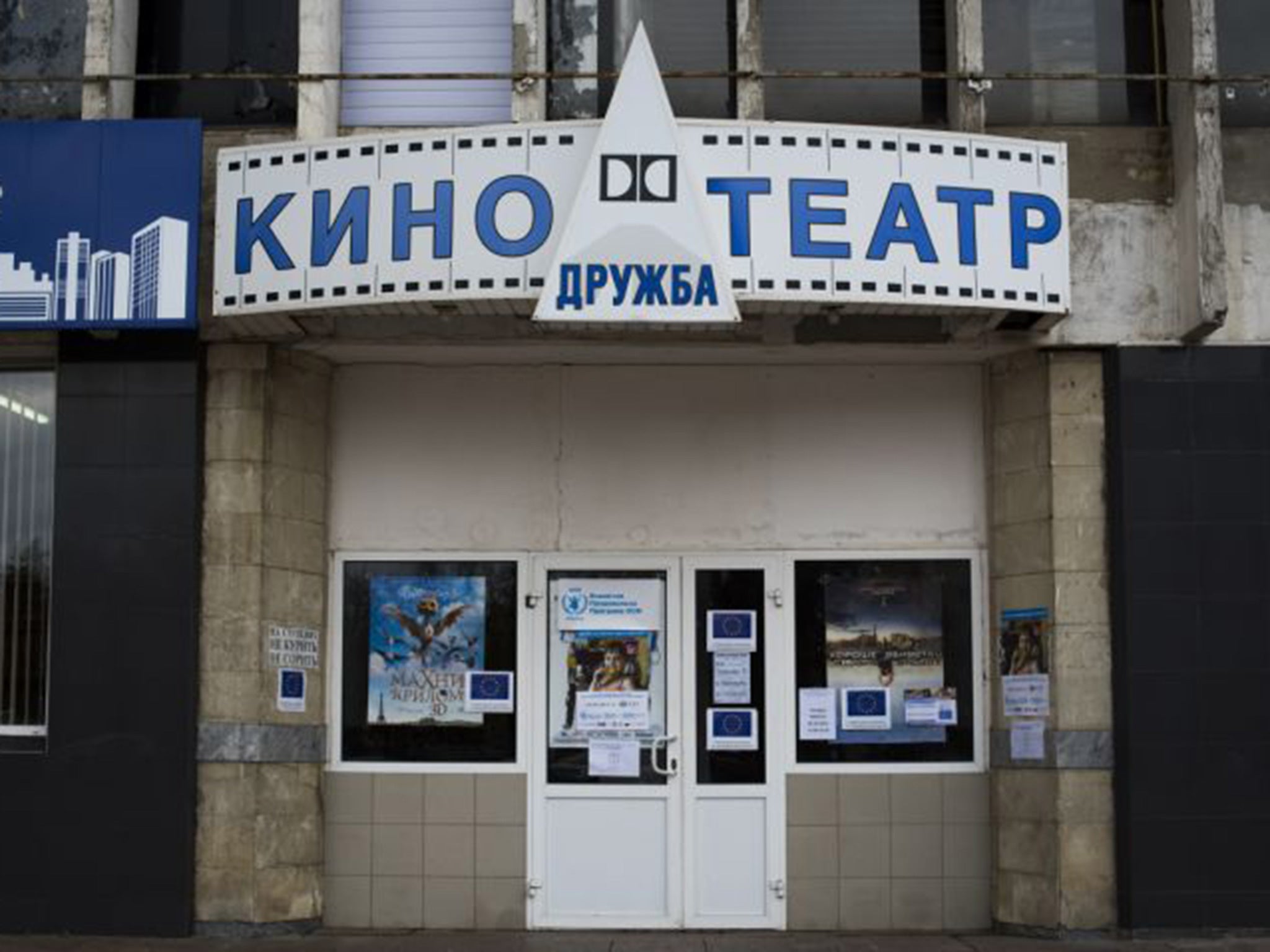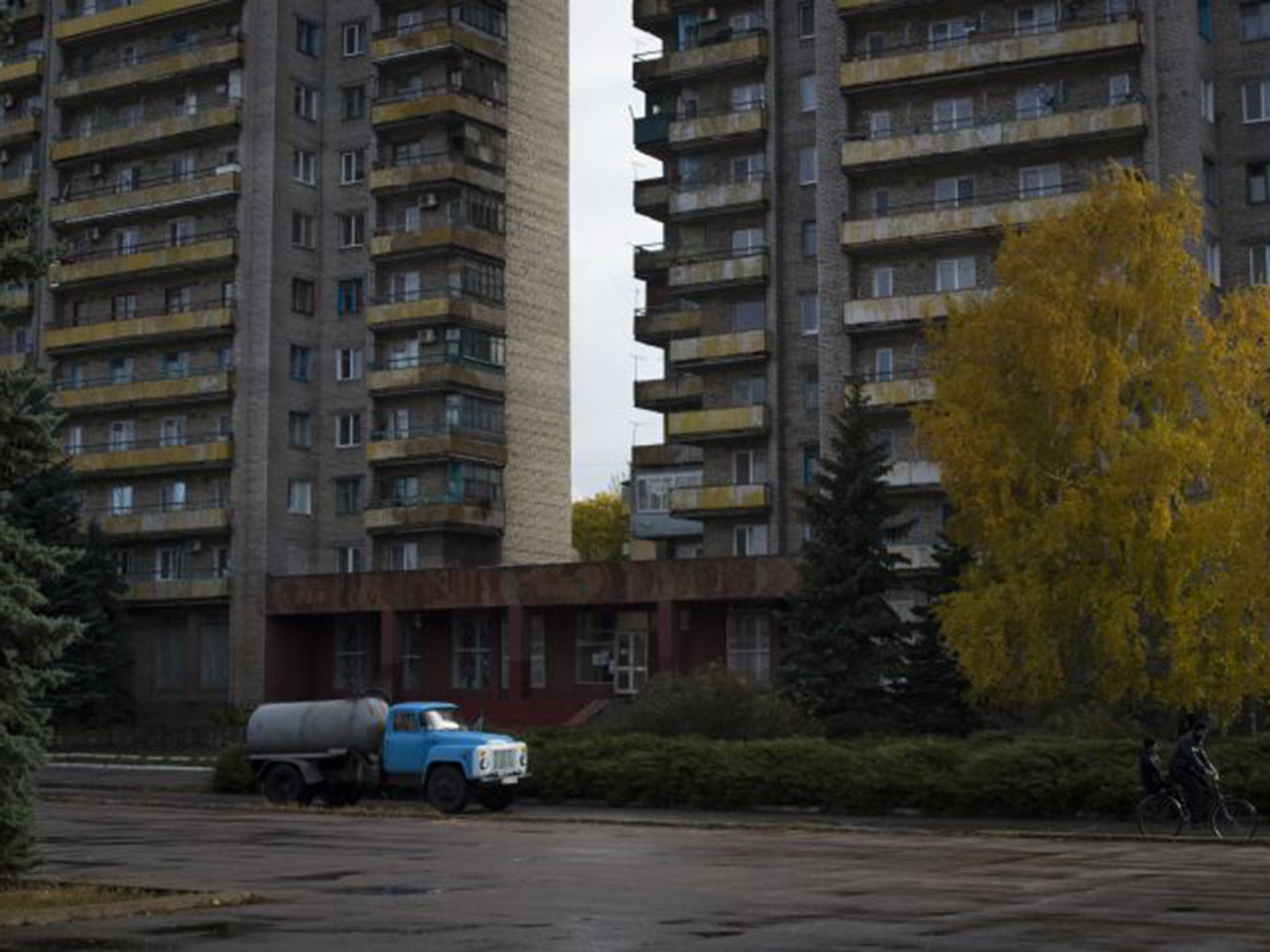Ukraine crisis: Forgotten victims of the war in east of country speak out as vital UN lifeline runs out of funds
‘We struggle each day, with no way out’

The moments before the artillery shell struck her cottage, Natalia Svergun had little chance of knowing how irrevocably her quiet life was about to change.
As the blast tore through her property, the single mother grabbed her five children and fled the destruction. For months, they were forced to camp in a nearby cowshed, where her youngest, aged almost two and suffering from cerebral palsy, died. In recent weeks, the family have returned to their gutted home, where they now live in impoverished squalor.
This is Europe in the 21st century: the interior is charred and pitiful, the smell overpowering, the family utterly destitute. Natalia’s children wear ragged clothes, their feet caked in dust and dirt. In short, the war has reduced her home to a slum.
“I have no way out – we struggle every day,” Natalia, 33, told The Independent on Sunday, her face haunted by months of trauma and loss. “I was so proud of my home and now it is nothing. I only live in hope that, one day, we can resume our old life.”
Based in the government-held town of Slovyansk, she is just one of the thousands of forgotten victims in Ukraine’s war-torn, industrial east – her plight, a powerful symbol of the wider disaster. Fighting between Russia-backed rebels and government forces in eastern Ukraine has so far killed more than 8,000 people since it began in March last year, and has destroyed communities across vast areas of the country’s industrial heartland.

Now, a humanitarian crisis is looming as violence surges and a major UN aid agency faces a multi-million-pound funding black hole at the onset of winter. NGO access to rebel-held territory remains, at best, sporadic and constricted by tortuous bureaucracy. At worst, it is non-existent. Senior officials allege that authorities in the self-proclaimed Donetsk and Luhansk People’s Republics use the promise of access as leverage to force the UN to recognise their legitimacy.
For the civilians beyond such tedious wrangling, the risk of malnutrition is increasing while the mercury continues to plunge. Internally displaced people (IDPs) and the most vulnerable, like Natalia, are torn between spending what little they have on food or on soaring utility bills to keep warm. For the worst affected, one option excludes the other. Faced with shortages in medicine and adequate shelter, many are woefully unprepared for winter.
The World Food Programme (WFP) is among many NGOs plugging the gap left by a government hobbled by corruption and a crisis-hit economy. It has provided a lifeline to more than 200,000 civilians here, distributing food parcels in rebel-held territory and electronic food vouchers in the worst affected parts of government-controlled Ukraine. As Natalia explained: “We couldn’t survive without the vouchers. The pressure would just be too much to bear. At least I can now keep the house warm.”

But the cash-strapped organisation faces a shortfall running to more than £20m, which threatens to derail the emergency response. It is lacking about £6.5m for this month and the next, and a further £15m for its 2016 operations. “WFP has not yet secured any funds for next year,” said Deborah Nguyen, a communications officer at the organisation’s Kiev HQ. “Winter is approaching very quickly. If no one helps, it will be disastrous.”
Urgent rounds of advocacy are now targeting international donors to prevent a catastrophic repeat of WFP’s fate in the Middle East, where sharp cutbacks this year forced the organisation to drop a third of Syrian refugees from its food voucher programme.
Aid workers in Ukraine hold grave fears over WFP’s deficit. “If these civilians don’t receive food vouchers, they will not eat – it’s as simple as that,” said Larisa Kobzarenko, a project manager with Adra, one of WFP’s on-the-ground partners.
In the drab, depressed town of Lysychansk – just an hour’s drive from the Russian border – Ms Kobzarenko’s team have commandeered a concrete, Soviet-era cinema as a food centre. Posters for Spiderman and The Incredibles beam over the heads of the steady stream of recipients.
“Without the aid, I don’t know how they would cope,” said Katya Fedotova, 24, Adra’s co-ordinator for the battle-scarred Luhansk region. “So many people are in need here, but we just don’t have the resources.”
Roman Goncharov, 42, waited in line to collect food vouchers for his mother. “Her house was destroyed last June – the shell fell straight into her kitchen,” the father-of-two said. “She suffered a stroke a month later from the stress of it all and now she’s paralysed. We can only keep hoping the war ends soon.”

Some families have resorted to living solely on buckwheat. “Meat is out of the question and their calorie intake is drastically reduced,” said Zulfia Sabir, WFP’s chief in eastern Ukraine. “They spend most of their money on utility bills, the percentage of which increases as the weather gets colder and prices go up.”
This war has displaced 2.3 million people. Away from the destruction of the front lines, Ukraine’s crisis can be deceptively invisible – those who have fled the fighting look like anybody else. But step inside a hostel for IDPs and their desperate plight is brought into sharp, disturbing relief.
In a five-storey block in the eastern town of Severodonetsk, one corridor is occupied by half a dozen IDP families. The conditions are dire, the smell musty and nauseating. In the communal kitchen, surrounded by peeling walls, a dirty sink and stark, exposed pipework, Natalia Prokupchuk, 31, described how she had fled the artillery blitz in nearby Pervomaisk.
“We arrived in this hostel last December and we’ve been here ever since,” said Natalia, a single mother who rents a single room with her daughter, aged two, and 54-year-old mother. The heating has not worked for weeks. “I’ve been suffering from depression, sleeping problems, stress … I constantly think about home and if I’ll ever be able to return.”
After paying the rent, she is left with the equivalent of around £2 a day. For her, the Ukrainian government has failed its most vulnerable. “They just don’t look after us. We couldn’t survive without the aid.”
Olga Lyshyk, the head of humanitarian affairs in the government-held Luhansk region, is well aware of the immense strain placed on government services. “We need all the help we can get from aid organisations,” she said. “We need to get food and medicine to young children and the elderly, especially before winter.”
The region faces huge challenges as officials try to restore devastated infrastructure as temperatures drop and hostilities escalate once more. The Red Cross is ramping up its activities to provide material to patch up destroyed homes, while Unicef has warned that damaged pipelines threaten to affect water, heating and electrical supplies, putting some 700,000 children at risk.
Yuriy Klimenko, the region’s Deputy Governor, is among those tasked with restoring the infrastructure across Ukraine’s devastated, industrial heartland. For him, only diplomacy can end the conflict.
“Everyone dreams of North and South Korea reuniting one day,” he said. “In the same way, many here dream of returning home to occupied territory. We all want to have Ukraine back. Nobody expected the war to turn out like this.”
Join our commenting forum
Join thought-provoking conversations, follow other Independent readers and see their replies
Comments